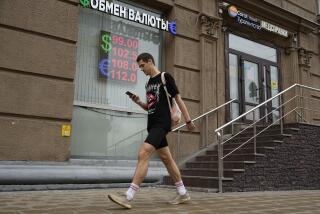Nervous Russian Investors Press Moscow on Reforms
- Share via
MOSCOW — Investors in Russia’s troubled economy met with Prime Minister Sergei V. Kiriyenko on Thursday, hoping for reassurance that the government is actually going ahead with the financial reforms it promised the International Monetary Fund before being granted a huge loan this month.
Despite the $22.6-billion IMF package for this year and next, the stricken Russian equity market has slid 5.8% in the last two weeks because investors still aren’t confident that the government means business.
Those continuing doubts were reflected in Thursday’s decision by international ratings agency Fitch IBCA to downgrade Russia’s long-term foreign-currency debt rating from BB to BB-, citing the administration’s failure to push a package of urgent economic reforms through the Communist-dominated lower house of parliament, the Duma. Standard & Poor’s lowered Russia’s rating last month.
“The uncertainty that the package is still out there, as well as the continued skepticism about the ability to implement it . . . is keeping investors out of the market,” Joseph Strubel, a fund manager at MFK Renaissance in Moscow, said before the meeting.
But Russian officials emerged beaming and upbeat from a session in which they had determinedly talked up their country’s prospects. Finance Minister Mikhail M. Zadornov said he is optimistic about the next three months, pointing out that cash revenues had increased 8% in the first half of 1998 and that the government had “outlined a tough financial plan for the next six months.”
Zadornov insisted that Russia has reached a “turning point” in collecting tax revenues, a vital ingredient in persuading the IMF to hand out its next dollop of money in mid-September. Russia received a first payment of $4.6 billion last week.
Zadornov said tax collection improved in July and predicted the trend would continue. “In June, the collections were better than in May, and in July they were better again,” Zadornov said. “I expect this tendency to continue in August.”
Central Bank Chairman Sergei Dubinin dismissed the possibility that the struggling ruble would be devalued. A stable ruble is the cornerstone of Russia’s economic policy.
The Bank of Russia said Thursday its gold and foreign currency reserves were back up to levels above those at the beginning of the year, when it began to spend money to defend the weakening ruble--an announcement it hopes will lure investors back into the market.
Reserves were at $17.8 billion on Jan. 1, but fell to $13.6 billion by July 17. Since the IMF released the first installment of money to Russia last week, reserves have gone back up to $19.2 billion, the bank said.
When the Duma balked at tough cost-cutting legislation last week, President Boris N. Yeltsin signed it into law anyway by presidential decree: an effective way of sidestepping parliament in the short term, but also a step viewed by some as ultimately detrimental to Russia’s shaky democratic hopes.
More to Read
Sign up for Essential California
The most important California stories and recommendations in your inbox every morning.
You may occasionally receive promotional content from the Los Angeles Times.













